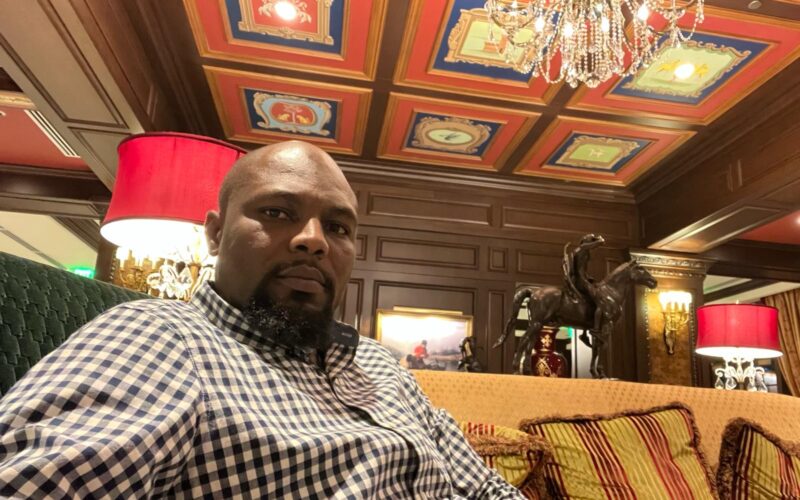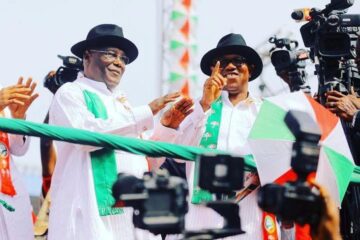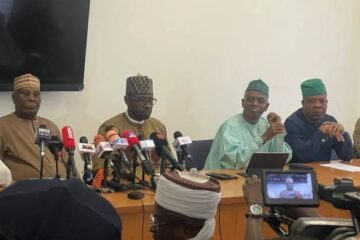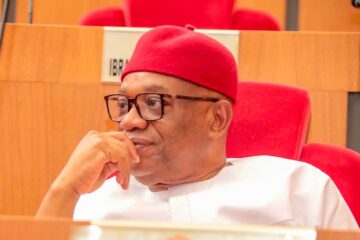As a Nigerian living in the US, I have been following the news about my home country with great concern and interest. Nigeria, the largest economy and oil producer in Africa, is facing a serious debt crisis that threatens its economic stability and future prospects. According to the National Bureau of Statistics, Nigeria’s public debt stock stood at N46.25 trillion (US$103.11 billion) in Q4 2022, an increase of 658 percent since 1999. Of this amount, N18.70 trillion (US$41.69 billion) was external debt, while N27.55 trillion (US$61.41 billion) was domestic debt.
The rising debt burden has been driven by several factors, including the disruption in the supply of food products, the increase in import cost due to the persistent currency depreciation, the general increase in the cost of production, and the soaring cost of the petrol subsidy, which will likely exceed five trillion naira this year. The COVID-19 pandemic, the war in Ukraine, and the global energy crisis have also worsened the situation, as they have reduced Nigeria’s oil revenues and increased its import bills.
As a result, Nigeria’s inflation rate surged to a 17-year high of 20.5 percent in August 2022, up from 17 percent in August 2021. This has eroded the purchasing power of Nigerians and pushed as many as five million more people into poverty since the start of 2022. The high inflation rate has also put pressure on the Central Bank of Nigeria (CBN) to devalue the naira, which has lost more than 50 percent of its value against the US dollar since 2015.
The naira’s depreciation has made it more expensive for Nigeria to service its external debt, which is mostly denominated in US dollars. According to the International Monetary Fund (IMF), Nigeria may spend nearly 100 percent of its revenue on debt servicing by 2026. The World Bank has also warned that Nigeria’s debt, while seemingly sustainable, is vulnerable and costly.
To address these challenges, some experts and activists have suggested that Nigeria should join BRICS, an economic bloc made up of Brazil, Russia, India, China, and South Africa, and ditch the dollar in its trade and transactions. BRICS, which considers itself a counterweight to Western powers, has been developing its own payment system, currency reserve pool, development bank, and credit rating agency to reduce its dependence on the US dollar and the Bretton Woods institutions.
Femi Falana, a human rights lawyer and senior advocate of Nigeria, has argued that Nigeria should join BRICS to trade with the naira instead of the dollar, and sell its crude oil and gas in naira as well. He said this would strengthen the naira and promote Nigeria’s economic sovereignty. Nigeria had applied to join BRICS in 2023, but its application was rejected at the 15th summit in Johannesburg. Instead, Argentina, Egypt, Ethiopia, Iran, Saudi Arabia, and the United Arab Emirates were admitted as new members.
However, joining BRICS and dedollarizing may not be as easy or beneficial as it sounds. First, Nigeria may not meet the criteria or the expectations of the existing BRICS members, who are looking for countries that can contribute to their economic and geopolitical interests. Nigeria’s economy is much smaller and less diversified than those of the BRICS countries, and its political and security situation is more unstable and unpredictable. Nigeria may also face resistance from the US and its allies, who may impose sanctions or other measures to discourage it from abandoning the dollar.
Second, Nigeria may not gain much from trading with the naira or selling its oil in naira, as the demand for the naira may not be high enough to support its value and liquidity. Nigeria’s trade with the BRICS countries is relatively low, accounting for only 13.5 percent of its total trade in 2020. Nigeria’s oil exports are also dependent on the global market, which is dominated by the US dollar and the Organization of the Petroleum Exporting Countries (OPEC), of which Nigeria is a member. Nigeria may not be able to influence the price or the demand for its oil by changing its currency of payment.
Third, Nigeria may not benefit from the BRICS institutions and initiatives, as they may not be able to provide adequate financing or technical assistance for Nigeria’s development needs. The BRICS New Development Bank, for instance, has a capital base of US$100 billion, which is much smaller than that of the World Bank, which has a capital base of US$329 billion. The BRICS Contingent Reserve Arrangement, which is meant to provide liquidity support for member countries facing balance of payments difficulties, has a size of US$100 billion, which is also much smaller than that of the IMF, which has a lending capacity of US$1 trillion.
Therefore, Nigeria may need to reconsider its options and strategies to deal with its debt, dollar, and development challenges. Rather than joining BRICS and dedollarizing, Nigeria may need to pursue more pragmatic and realistic policies, such as diversifying its economy, improving its fiscal and monetary management, enhancing its domestic revenue mobilization, reducing its wasteful and corrupt spending, reforming its subsidy regime, strengthening its social safety nets, and engaging constructively with its creditors and partners.
As a Nigerian-American, I hope that Nigeria can overcome its current difficulties and achieve its full potential as a prosperous and peaceful nation. I also hope that the US and other countries can support Nigeria’s efforts and cooperate with it on common issues and interests. Nigeria is a strategic partner and a valuable ally for the US and the world, and its success is in everyone’s interest.




